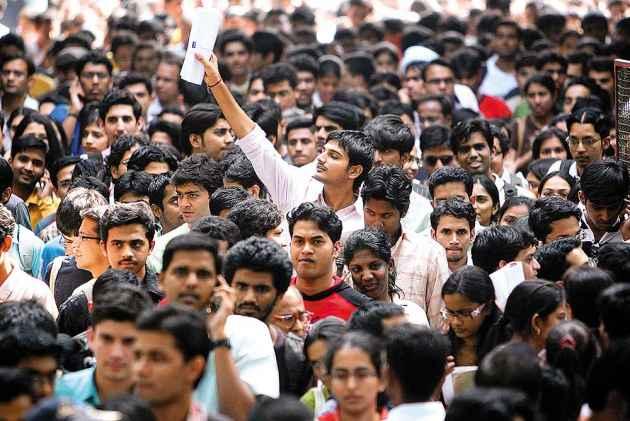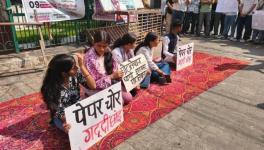Unemployment Crisis: Tamil Nadu Youth Struggling Hard To Find Jobs

Representational image. | Image Courtesy: Outlook
The Tamil Nadu Public Service Commission (TNPSC) received more than 20 lakh applications — when it called for applications for 9,351 vacancies in Group-IV category in the year 2018. This means that 213 applicants were competing for each vacancy, which sheds a light on the desperate status of unemployment in the state.
What’s more, 84 lakh people are registered in the employment exchanges. The number of registrations has been coming down in the recent years, due to a decreasing possibility of job appointments through the government agency. Youngsters are left with no option but to sell their skills for very low wages.
Unemployment Higher In Urban Than Rural
Even though the state is known for migration into urban cities, around 50 per cent of the adolescent and youth population live in rural areas as per the 2011 census. Around 24 per cent of the rural youth are employed as agricultural labourers for meagre wages and literally no social security, while the urban youth cut an even more sorry figure.
Unemployment among urban youth is relatively higher than that among their rural counterparts (58.80 per cent as against 41.19 per cent). The urban youth face a much harder time finding a job in spite of high industrialisation in urban areas.
And even those who are employed have only contractual or temporary jobs. Take 26-year-old Rajesh Kumar (name changed), who has been working for the past 3 years at a multinational automobile company on the outskirts of Chennai, but is yet to become a permanent employee.
“I am still a temporary worker and the company is not ready for permanent appointment. If we try to organise a struggle, all of us will become jobless”, he says.
Thousands of graduates and professionally qualified youth are forced to take up the job of delivery boys in companies like Zomato, Uber Eats, Swiggy, etc. Their earnings after 12 to 14 hours of work amount to a paltry sum of Rs 200 to Rs 400 per day.
A 24-year-old engineering graduate says, “We have to travel long distances within the city limits on our motorcycles to earn a very small sum. We have to look after our family and cannot stay any further without earning at least some decent amount.”
Also read: Disaster of Demonetisation: Tamil Nadu Industries Struggle to Regain Shape
The exploitation of the young workforce continues in many industries, both organised and unorganised. On the other side, the job losses are at a high in the state, particularly due to the adverse impacts of demonetisation and the Goods and Services Tax (GST).
The state government has announced in the assembly that around 50,000 Micro, Small, Medium Enterprise (MSME) units were closed in 2016-17, resulting in 5 lakh job losses.
State Government Set Up Panel To Reduce Staff
In a measure seen as adding insult to injury, the state government went a step ahead by constituting a ‘Staff Rationalisation Committee’ through a Government Order [G.O. Ms. No.56 Finance (CMPC) Department dated 19-02-2018].
This committee was set up to evaluate “the staff structure in various departments and identify non-essential posts so as to reduce the revenue expenditure”. In addition, the committee was supposed to “identify the categories of posts to be outsourced or appointed through contract as a measure to control expenditure”.
With various departments under the state government struggling with severe staff shortage, this measure came as a shocker to all. The employees’ unions held protest demonstrations and went to the extent of burning the Government Order at all district headquarters. Various youth organisations demanded that the GO be scrapped to ensure filling up of the existing vacancies without cutting of jobs.
Vacancies Aplenty In Central Government Organisations
The central government too is not in favour of filling the vacancies existing in various departments, including in the Public Sector Undertakings (PSUs). The replies of the government in both houses of the Parliament during the winter session in 2017-18 painted a sorry picture of the state of affairs. Indian Railways had 2.5 lakh vacancies, defence and paramilitary forces had 1.2 lakh vacancies, and the health sector had 1.5 lakh vacancies. The Sarva Shiksha Abhiyan — a centrally sponsored scheme with one of its aims as maintaining the desired staff-student ratio by the states and union territories in schools — had 10.1 lakh vacancies.
Also read: Elections 2019: Demonetisation and GST May Ruin BJP’s Hope in Coimbatore
In the meantime, the government has been cutting down the funds for public education — and promoting the entry of corporate and Big Capital through undertaking dubious steps such as declaring the non-existent ‘Jio University’ of Mukesh Ambani’s Reliance Group as an ‘Institute of Excellence’.
The Modi government, which during the 2014 elections had promised to create 2 crore new jobs every year, appears to have no intentions of filling up the existing vacancies — while moving at an unprecedented pace towards privatisation and outsourcing in many sectors, making clear the priorities of the government.
In the same Parliament where Modi had shed tears when he first stepped in, the Prime Minister said that the youth can make a living by selling pakodas. Lakhs of youths in different cities had protested against this shameful statement of the PM by wearing their graduation gowns and hawking pakodas.
Dissatisfaction Youth To Impact Poll outcome
Not only has the BJP failed to fulfil its previous poll promise of 2 crore new jobs each year, but in fact the country has seen the unemployment rate zoom to the highest in 45 years.
Also read: Thwarted NSSO Report Pegs Unemployment Rate at 4-Decade High of 6.1% in 2017-18
The state of Tamil Nadu, too, has felt a severe impact of the job losses. The state government has time only to keep their flock together and rule the state for the remainder of the term with the AIDMK splitting after the death of former Chief Minister J Jayalalithaa.
The AIADMK and BJP are contesting together, though without much achievement to show. The BJP leaders are not uttering a word about the employment created under the Modi-regime and the AIADMK continues to assert that the party will carry out the welfare measures as it did under Amma (as the late CM Jayalalithaa is popularly called).
With the state and central governments keeping mum on their promises, the electoral outcome will depend largely on how the disillusioned youth of the state choose to exercise their vote.
Get the latest reports & analysis with people's perspective on Protests, movements & deep analytical videos, discussions of the current affairs in your Telegram app. Subscribe to NewsClick's Telegram channel & get Real-Time updates on stories, as they get published on our website.
























